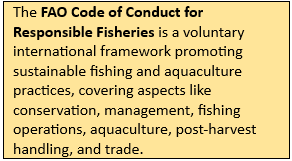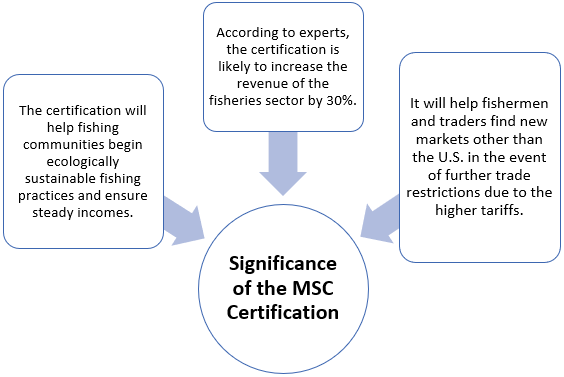Syllabus:
GS-2: Government policies and interventions for development in various sectors and issues arising out of their design and implementation.
GS-3: Indian Economy and issues relating to planning, mobilization of resources, growth, development and employment.
Context: Recently, about 10 Indian marine and saline fish and shrimp varieties are set to get the global Marine Stewardship Council (MSC) certification.
Marine Stewardship Council (MSC) certification
• MSC Certification is an internationally recognized ecolabel for sustainably sourced seafood from wild-capture fisheries, ensuring fish stocks are healthy, environmental impacts are minimized, and the fishery is well-managed.
The FAO Code of Conduct for Responsible Fisheries is a voluntary international framework promoting sustainable fishing and aquaculture practices, covering aspects like conservation, management, fishing operations, aquaculture, post-harvest handling, and trade.

• This certification involves independent, third-party assessments against three principles which are stock health, environmental impacts, and effective management.
• It is valid for five years which is subject to annual audits.
• It is based on the United Nations Food and Agriculture Organization’s Code of Conduct for Responsible Fisheries and Guidelines for the Eco-labelling of Fish.

Pradhan Mantri Matsya Sampada Yojana (PMMSY)
• launched in the Union Budget 2019–20 to address critical gaps in the fisheries sector.
• The scheme focuses on enhancing fish production and productivity, improving quality, infusing modern technology, developing post-harvest infrastructure and management, modernizing the value chain, ensuring traceability, and promoting the welfare of fishers.
• PMMSY has significantly transformed India’s fisheries sector by promoting growth, sustainability, and inclusivity.
- Fish production in India reached a record 195 lakh tonnes in 2024–25, up sharply from 141.64 lakh tonnes in 2019–20.
- India has become the second-largest fish producer globally, contributing nearly 8% of the world’s total fish production.
- Fisheries exports have grown robustly, increasing from ₹46,662.85 crore in 2019–20 to ₹60,524.89 crore in 2023–24, strengthening India’s position in the global seafood market.

